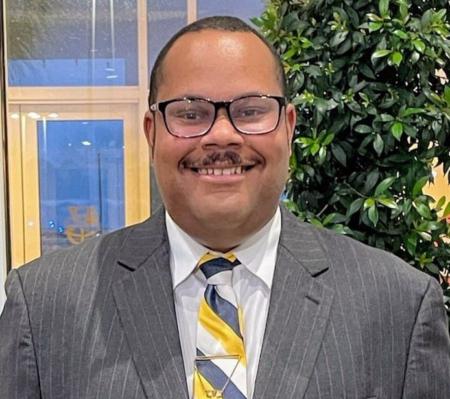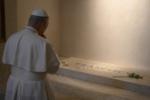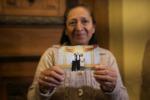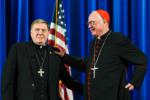New pope's Black, Creole roots illuminate rich multiracial history of US
(OSV News) -- A New Orleans genealogist has found that the first U.S.-born pope has Black and Creole roots -- and the discovery illuminates the nation's rich multiracial history, the experience of Black Catholics and the importance of the church's sacramental records.
Jari Honora, a certified genealogist and a family historian for the Historic New Orleans Collection museum, told OSV News that Pope Leo XIV's former surname, Prevost, immediately piqued his interest.
Yet for all his extensive research experience, even Honora was surprised when he discovered that the maternal grandparents of Pope Leo XIV, Joseph Martinez and Louise Baquié, were listed on several census documents as Black or mulatto.
Their 1887 marriage license names Martinez's country of birth as Haiti, with birth records showing his city of birth as Santo Domingo (then part of Haiti, and now the capital of the Dominican Republic).
"We have a lot of Prevosts here in New Orleans and in south Louisiana, but that wasn't the direction I was going in," Honora said. "I honestly thought that by him (Pope Leo XIV) being a native Chicagoan -- so many of the people in that Great Lakes region … who have French surnames, they're French Canadian, or they come from people who in more recent decades migrated from France. And that's what I was expecting."
The expectation "has proven to be true" on the pope's paternal side, with that lineage hailing from "French and Italian immigrant backgrounds," he said.
But "once you go down a rabbit hole, you don't stop," Honora said, and soon he "stumbled across a transcript of the Holy Father's mother's birth certificate, as well as her Social Security death index entry."
Those documents, he said, "both gave her parents' names as Joseph Martinez" -- commonly pronounced in New Orleans with a stress on the first syllable, he explained --"and Louise Baquié."
While he surmised that "Martinez could come from a lot of places," Honora said the name Baquié "sounds like it comes from quite close to home. That's a New Orleans name. And sure enough, the birth certificate gave … the birthplace of the mother as New Orleans."
Honora said he "just pursued it from there," and "lo and behold, the pope has deep, deep connections on his mother's side … to New Orleans."
Once the family had moved from New Orleans to Chicago sometime between 1910 and 1912, however, the family began identifying itself as white, as indicated in the 1920 U.S. Census.
The practice -- known as "passant (passer) à blanc," French for "passing (to pass) for white" -- was then a common means of avoiding racial discrimination, as described by Stanford historian Allyson Hobbs in her book "A Chosen Exile."
Honora told OSV News the switch in the racial identification of the pope's family reminded him of the 19th-century Healy family, whose 10 children -- several of them later assuming prominent roles in the U.S. Catholic Church -- were born of the union between Georgia plantation owner and slaveholder Michael Healy and his common-law wife Eliza, who was of mixed race.
Many of the couple's sons and daughters, considered slaves by birth, were able to pass as white, and were sent by their father to the nation's North -- which had gradually abolished most forms of slavery -- for their education. Several entered religious life, most notably Bishop James Augustine Healy of Portland, Maine, the first African American Catholic bishop; Jesuit Father Patrick F. Healy, who in 1873 became the 29th president of Georgetown University; Father Sherwood Healy, rector of the Cathedral of the Holy Cross in Boston; and Eliza Healy, a superior in several convents of the Congregation of Notre Dame.
"All of them, in order to pursue their vocations in America back in the 1840s and '50s, they had to conceal their mixed race identity. They were born to a formerly enslaved woman and an Irish dad," said Honora. "And the fact that here, 150, 160-odd years later, our first American pope -- his family shares in that story of being of mixed race and then having to conceal that. It's just eerie. You can't make it up."
As a Catholic, Honora said he was "thrilled" by his findings about Pope Leo's ancestry.
"This (New Orleans) is such a Catholic city," he said. "The fact that we sort of share this distinction … with the Archdiocese of Chicago as being home to the first American pope is just incredible."
Honora has shared his research with both the Chicago and New Orleans archdioceses, and plans in the near future to develop an exhibit with the latter's archives "showcasing the wonderful sacramental sources we have on the Holy Father's ancestry."
Those sacramental records -- marking baptisms, confirmations, marriages and funerals -- are crucial, Honora said.
"We're so fortunate that we have sacramental records here in this archdiocese for whites, free people of color and the enslaved that go back to 1718," he said.
Honora called such records "sacred volumes," where "you can find … some of the poorest, the illiterate, immigrants, as well as the ancestors of millionaires and popes and kings. And they're all recorded the same in these books, because first and foremost, they're created by the church to document the reception of the sacraments."
He pointed to the 1997 circular letter on "The Pastoral Function of Church Archives," in which the Pontifical Commission for the Cultural Patrimony of the Church described such archives as "places of memory of the Christian community and storehouses of culture for the new evangelization."
And, he noted, "they serve as these wonderful genealogical sources, and I work with them a lot in our archdiocesan archives, which does a good job of preserving them."
Honora called for expanding resources to digitize diocesan records, adding that "some of the larger archdioceses" -- among them, Boston, Cincinnati and Philadelphia -- "have really made progress" in doing so.
He also hopes his discovery about the pope's roots will bring "greater attention" to the history of the nation's Black Catholics, and in particular to the canonization cause of New Orleans' hometowner Henriette Delille, a free woman of color who founded the Sisters of the Holy Family in 1842. She was declared "Venerable" by Pope Benedict XVI in 2010.
"Her ancestry is exactly the same as the Holy Father's," said Honora.
He quipped that his passion for his work and his faith make him "probably one of the few people, when the reading of the day is the genealogy of Christ, whose mind doesn't just start to wander."
Those scriptural family trees "help us to know that even Our Lord was situated in a very real historical and familial context -- to be of the house of David, to be the son of Joseph; this meant something," said Honora. "These are not just sort of additional references that we find in the Gospels. This linked him to the Old Testament and to his Jewish roots."
And, said Honora, "We all find ourselves in that position. We all have bonds to our biological families, our spiritual family, like our godparents and our confirmation sponsors, the people who stand witness at our weddings and that sort of thing. … It just speaks to the fact that we belong to a universal church, one that is for everyone and can be embraced by anyone."
Speaking of welcome, Honora said, "We're definitely hoping that when Pope Leo begins his papal visits, including North America, New Orleans has to be on his itinerary. It has to be."
The menu and the musicwill be on order for the pope, he added.
"We promise that we'll have good gumbo and a nice second line for him," said Honora, referring to a lively street parade tradition led by a brass band.
- - - Gina Christian is a multimedia reporter for OSV News. Follow her on X @GinaJesseReina.



















